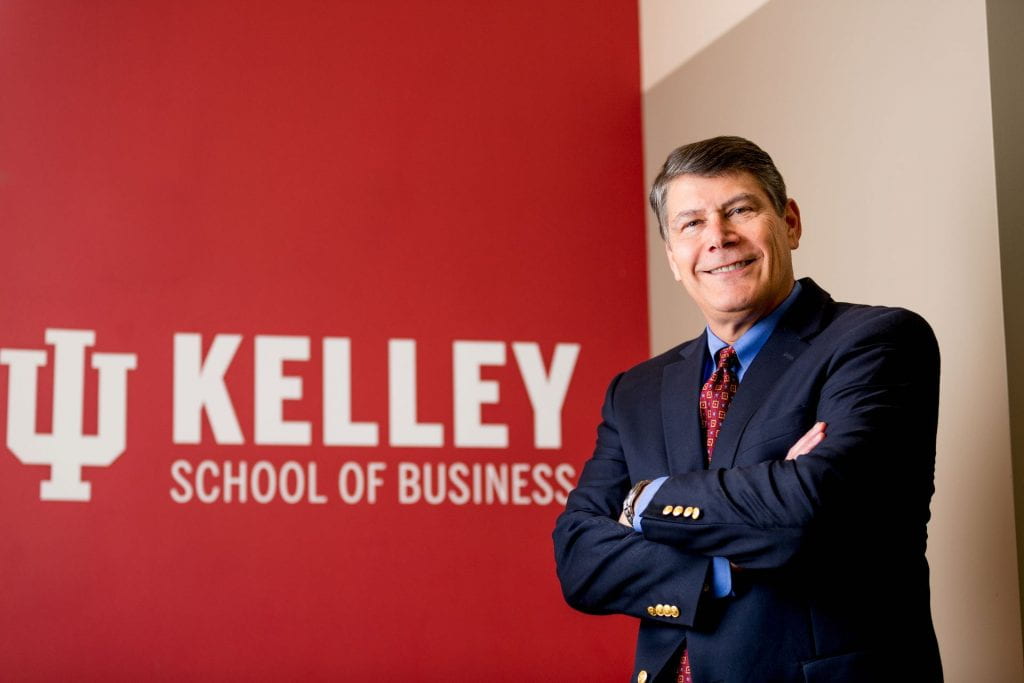
WASHINGTON — Michael R. Baye, the Bert Elwert Professor of Business Economics at the Indiana University Kelley School of Business, has been appointed to the Consumer Financial Protection Bureau’s Academic Research Council, which advises bureau leadership on a broad range of consumer financial issues and emerging market trends.
Baye, who joined the Kelley School faculty in 1997, previously served in Washington, D.C. as director of the Bureau of Economics at the U.S. Federal Trade Commission in 2007-08.
In his new appointment, Baye will serve for the next two years in an advisory capacity as a member of the CFPB’s Academic Research Council. It advises the bureau on its strategic research planning process and research agenda. It also provides feedback on research methodologies, data collection strategies, and methods of analysis, including methodologies and strategies for quantifying the costs and benefits of regulatory actions.
“When I returned from the FTC, my students really enjoyed learning first-hand about current policy issues. I was also able to share useful information with colleagues,” Baye said. “The value of that knowledge has depreciated over the past decade, and it will be good to have fresh insights to share.
“It is certainly an honor to serve our country,” he added. “America has given me so many opportunities, and I welcome the opportunity to give something back. “
The Consumer Finance Protection Bureau was created in 2010, when President Barack Obama signed the Dodd-Frank Wall Street Reform and Consumer Protection Act.
While Baye’s responsibilities in antitrust and consumer protection at the Federal Trade Commission precluded him from specializing in applications to the financial sector, much of his time was devoted to economic analyses of consumer protection matters in financial markets — including payday loans, fair lending and studies on the efficacy of mortgage disclosures. Today, the CFPB is now responsible for protecting consumers in these markets.
 In his new advisory role, Baye will help the ensure that CFPB Director Kathleen Kraninger has all of the knowledge, tools and capabilities necessary to protect consumers in financial markets. He and his colleagues on the Academic Research Council will not have any formal decision-making roles.
In his new advisory role, Baye will help the ensure that CFPB Director Kathleen Kraninger has all of the knowledge, tools and capabilities necessary to protect consumers in financial markets. He and his colleagues on the Academic Research Council will not have any formal decision-making roles.
This spring, Kraninger announced a series of enhancements to the bureau’s advisory committee charters, including elevating the Academic Research Council to a director-level advisory committee and increasing the frequency of its meetings, which Baye may attend in person or via videoconferencing. “Great thing about working today is that, with video calls, collaboration can be done without travel,” Baye said.
Baye said his academic and practical experience in economics and econometrics should help the bureau maintain and develop the human resources, knowledge and scientific tools needed to conduct data-driven, evidence-based policy analysis to ensure that well-intentioned policies designed to protect consumers do not have adverse, unintended consequences.
“I prefer to solve real-world rather than hypothetical problems, and these experiences are all about the real world. Staff at the FTC and CFPB are highly knowledgeable about real-world economic institutions, and it is great to have an opportunity to learn from smart people who deal with real-world problems on a daily basis,” Baye said. “In the case of ARC, I will be working with other professors with differing areas of expertise, and it will be great to learn from them as well.”
Baye was one of seven scholars from across the country appointed to the Academic Research Council. Others include Karen Dynan, former assistant secretary for economic policy and chief economist at the U.S. Department of the Treasury from 2014 to 2017 and now a Harvard professor; and John Lynch Jr., senior associate dean for faculty and research at the Leeds School of Business at the University of Colorado.
“I owe a great debt to the research environment at the Kelley School,” Baye said. “I have benefited from more than 20 years of conversations with and learning from IU colleagues. This makes it difficult for me to know whether any advice I might offer the CFPB comes from me or one of my colleagues.”
His research focuses on advertising and pricing strategies and their impact on consumer welfare and firm profits in online and traditional markets. His research on the economics of information, advertising, pricing, competition, game theory and other areas related to consumer protection has been published in journals such as American Economic Review, the Journal of Political Economy, Econometrica and Management Science. He has co-authored a variety of textbooks, including “Managerial Economics & Business Strategy (now in its ninth edition with McGraw-Hill)” and “Money, Banking & Financial Markets: An Economic Approach.”
A Fulbright Research Scholar at Erasmus University Rotterdam, Baye has held visiting appointments at Cambridge University and the University of Oxford in the United Kingdom, Erasmus University and Tilburg University in Europe, the New Economic School in Russia and Chapman University, a private school in California. He holds a Bachelor of Science degree in economics from Texas A&M University and a PhD in economics from Purdue University.